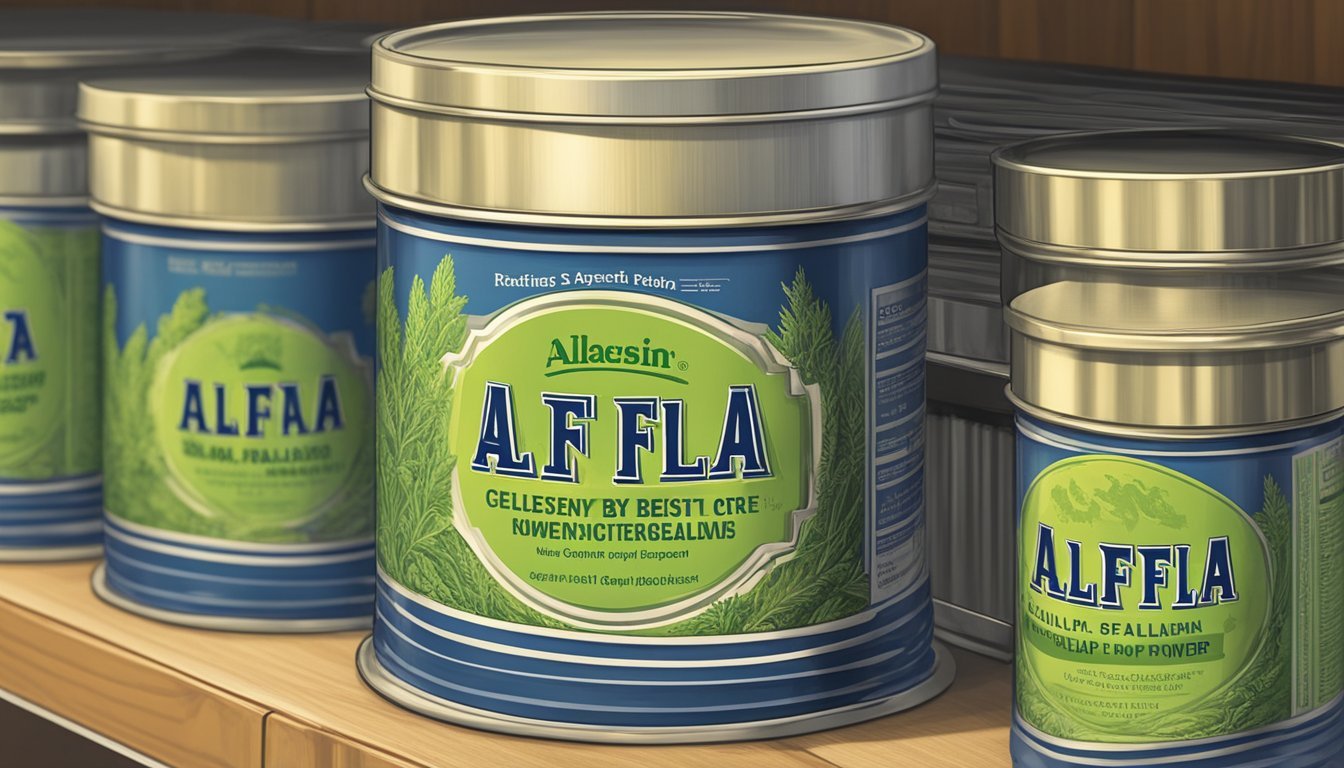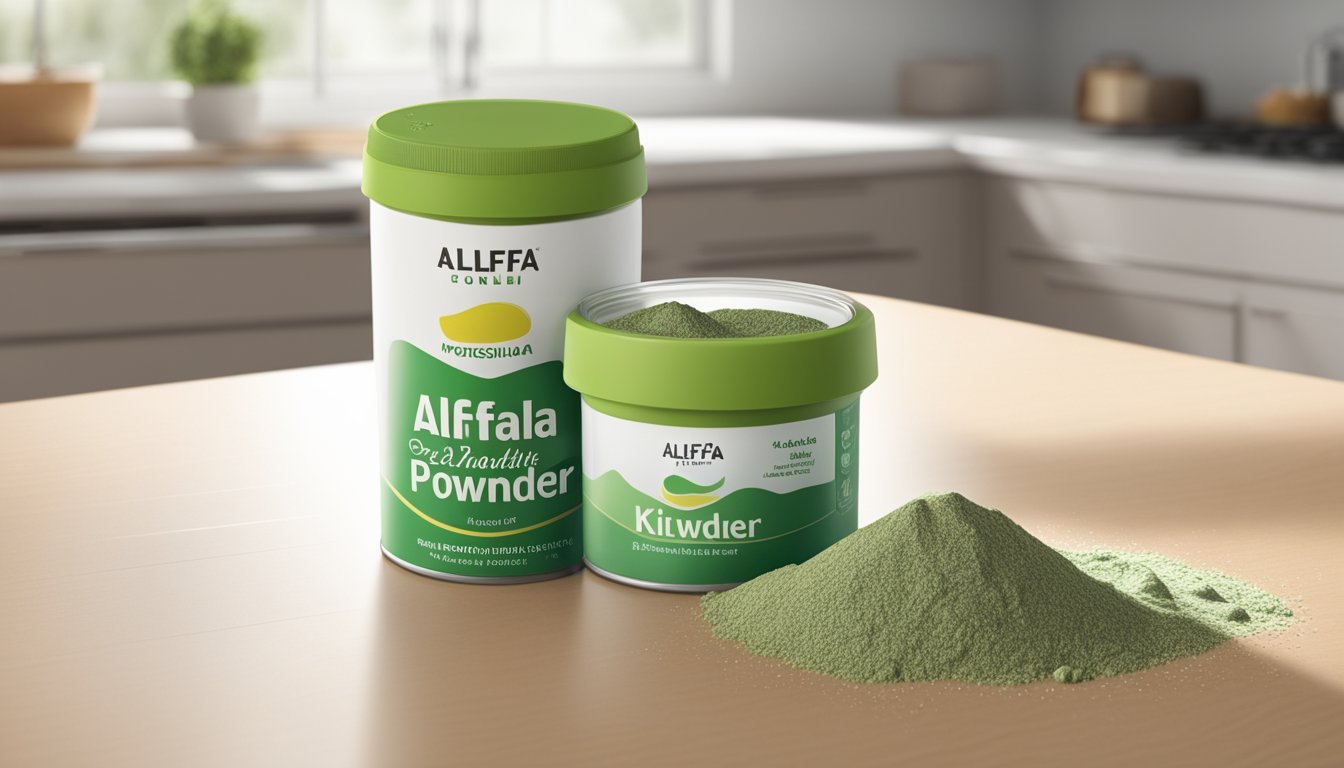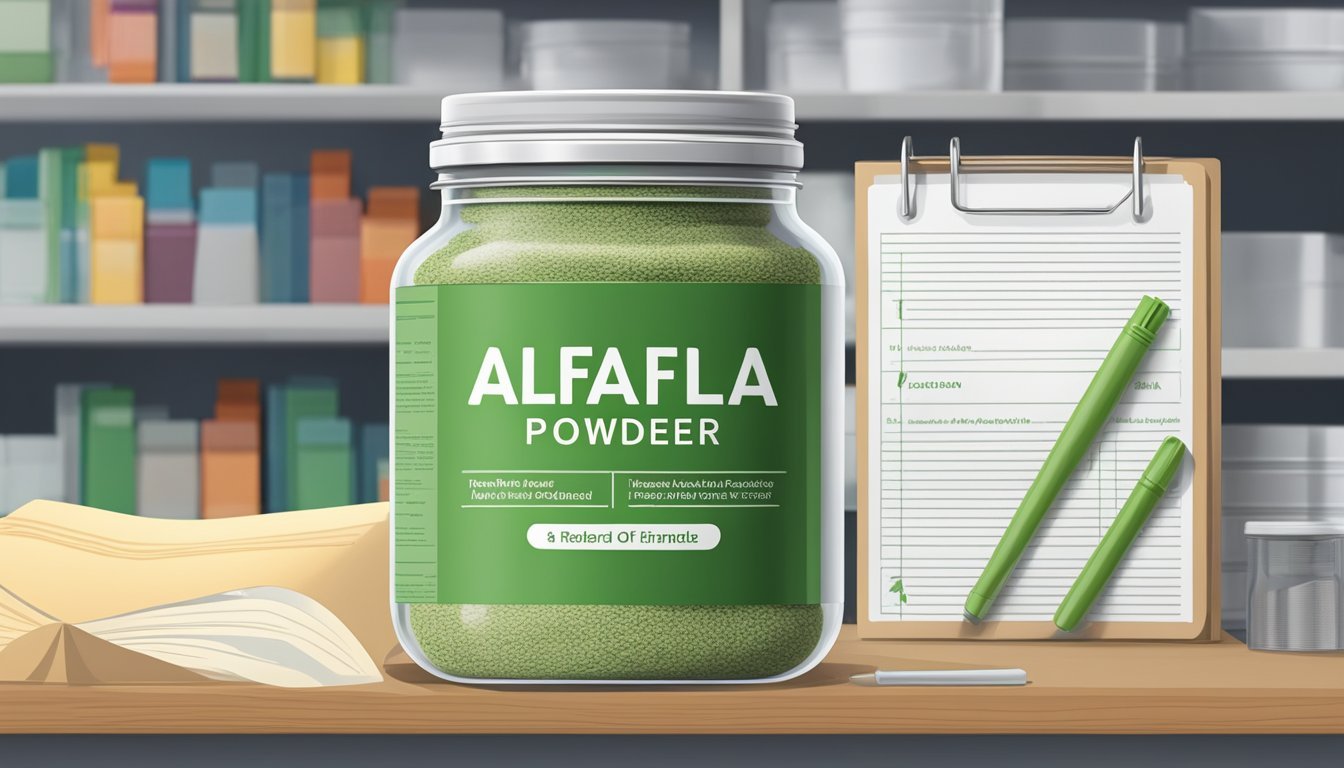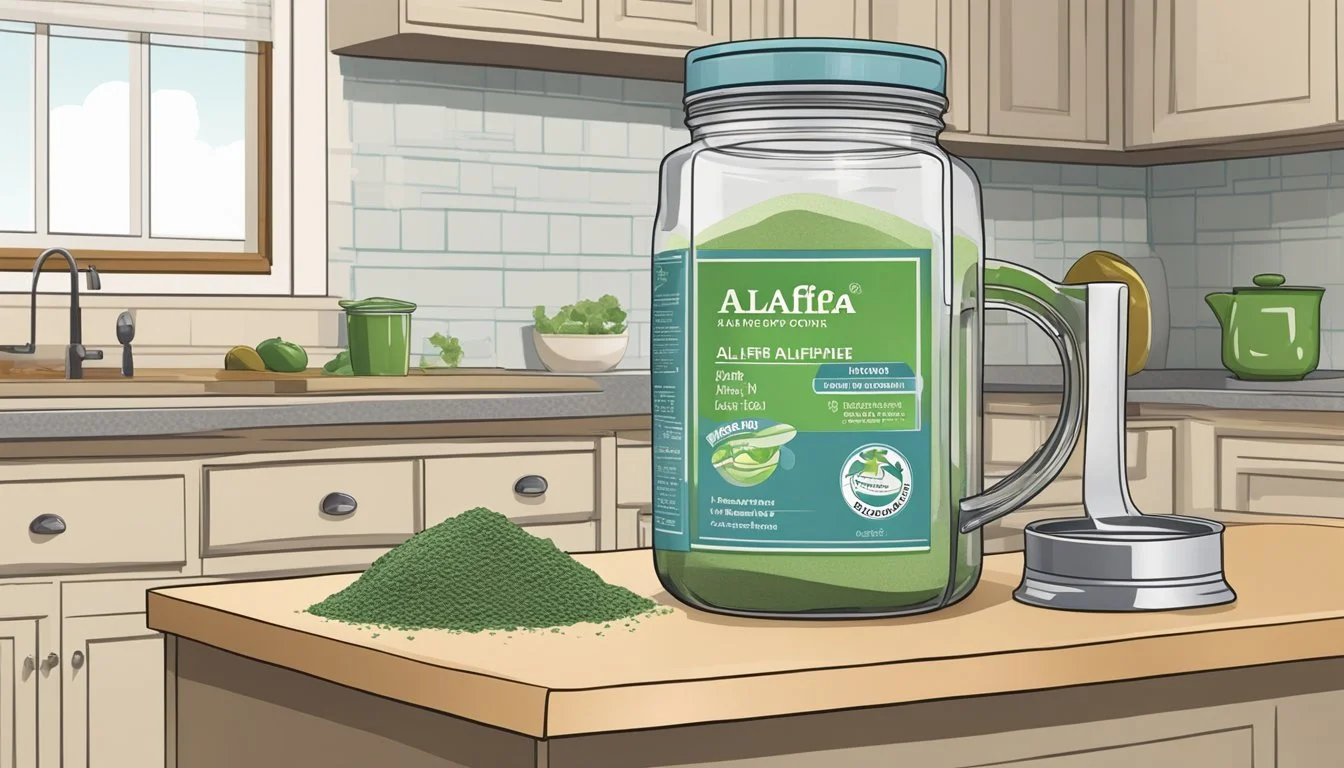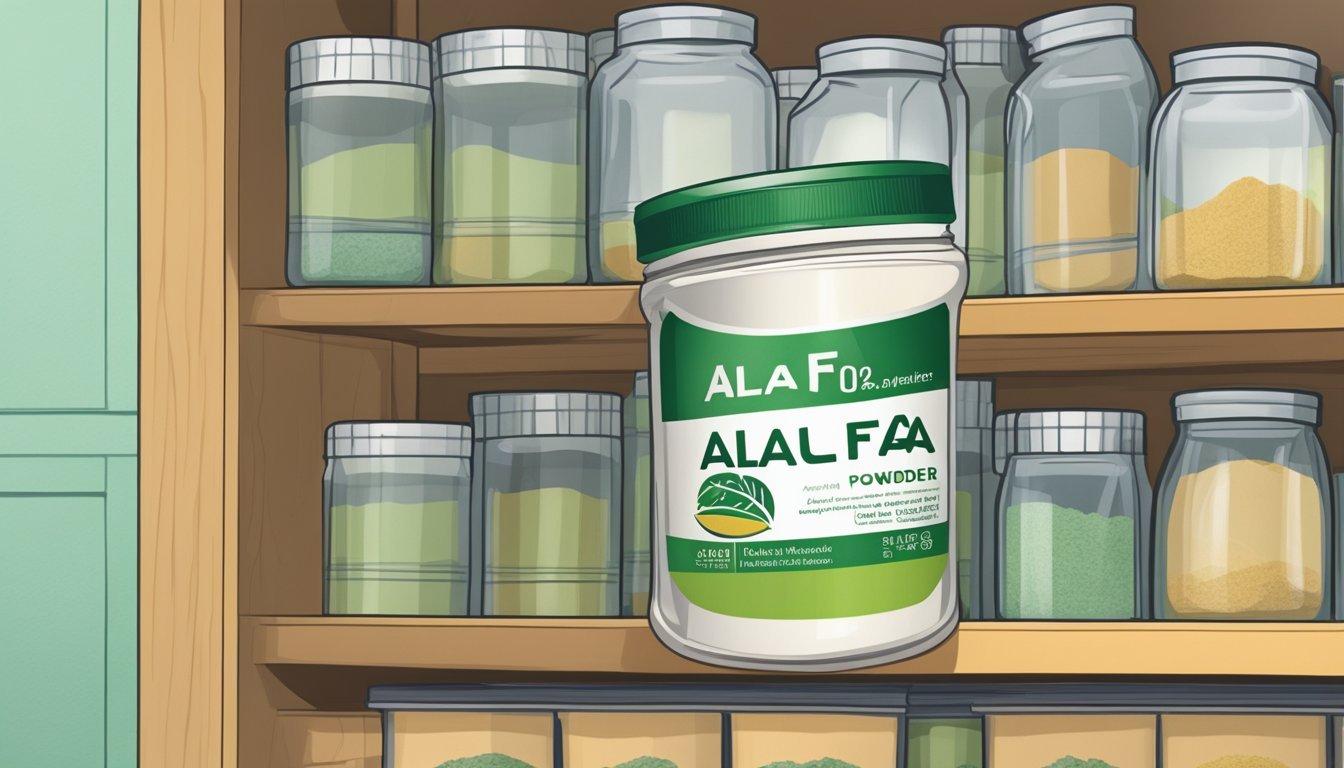How Long Does Alfalfa Powder Last?
Shelf Life and Storage Tips
Alfalfa powder, derived from the Medicago sativa plant, is valued for its high nutrient content, boasting vitamins such as A, C, E, and K, along with minerals like calcium, potassium, and iron. Given its nutritional benefits, many individuals incorporate alfalfa powder into their diet for its potential to support the immune system, promote healthy skin, aid in proper vision, and assist in blood clotting. However, consumers often question the shelf life of alfalfa powder to ensure they're reaping the benefits while the product is still potent.
The shelf life of alfalfa powder is influenced by several factors including storage conditions, moisture levels, and packaging. When stored properly in a cool, dry place and in an airtight container, alfalfa powder can last between two to three years. It's important to avoid exposure to direct sunlight and heat, as these can degrade the quality of the powder over time. Even within these recommended conditions, the potency of the vitamins and minerals might diminish gradually, which is why it's advisable to use the powder closer to the time of purchase for maximum benefits.
Understanding the signs of spoilage is also essential for consumers. A change in color, odor, or the presence of clumps can indicate that alfalfa powder is no longer at its prime quality. If any of these signs are observed, it's best to err on the side of caution and dispose of the powder, as these changes can signify a reduction in nutritional value or, in some cases, spoilage that could lead to food-borne illness.
Alfalfa Powder Preservation
Proper preservation of alfalfa powder, also known as lucerne, is essential for maintaining its quality and nutritional value. The following subsections discuss how one can effectively store alfalfa supplements to ensure their longevity while minimizing the risk of contamination, including common pathogens like Salmonella or E. coli.
Optimal Storage Conditions
Temperature: Store alfalfa powder in a cool, dry place, away from direct sunlight and heat, to maintain its quality. Optimal storage temperatures are below 70°F (21°C).
Container: It should be kept in an airtight container to prevent moisture and other contaminants from entering.
Environment: A dry pantry or cupboard is ideal, as humid environments can promote the growth of mold and bacteria.
Shelf Life and Expiration
Manufacturer’s Date: Always check the best-by date provided by the manufacturer as a reference for freshness.
Duration: Generally, unopened alfalfa powder can last between 2-3 years when stored correctly. Once opened, it should be consumed within six months for peak quality.
Renewal: If the alfalfa supplement is used beyond these time frames, it may not provide the intended dietary benefits.
Signs of Spoilage
Visual: Presence of mold or any other change in appearance may indicate spoilage.
Odor: A musty or off smell is a clear indication that the alfalfa powder should not be consumed.
Texture: Any caking or clumps from moisture exposure suggests that the product has been compromised.
By adhering to these preservation guidelines, one can ensure that their alfalfa powder remains safe and effective for consumption over its useful lifespan.
Nutritional Profile
Alfalfa powder is a concentrated source of various essential nutrients that contribute to overall health. It is particularly known for its rich array of vitamins and minerals, as well as for its high protein and fiber content which are integral to a balanced diet.
Vitamins and Minerals
Alfalfa powder provides a spectrum of vitamins, including Vitamin K, essential for blood clotting and bone health. It is also a good source of Vitamin C, an important antioxidant, and Vitamin A, which is crucial for vision and immune function. The mineral content in alfalfa powder is notable, offering Calcium for strong bones and teeth, Magnesium for muscle function and energy production, and Potassium for cardiovascular health. Additionally, it contains trace minerals such as Iron, important for oxygen transport in the blood, Manganese for metabolism, Copper for enzymatic reactions, and Phosphorus for cell repair and maintenance.
Vitamin K: critical for blood coagulation and bone metabolism
Vitamin C: antioxidant that supports the immune system
Vitamin A: important for healthy vision and immune function
Calcium: essential for bone health and muscle function
Magnesium: contributes to metabolic health and energy production
Potassium: supports cardiovascular health
Trace minerals (Iron, Manganese, Copper, Phosphorus): vital for a range of physiological processes
Protein and Fiber Content
Alfalfa powder is a plant-based protein source, making it a valuable addition to vegetarian and vegan diets. The protein in alfalfa aids in muscle repair and growth. Furthermore, its fiber content promotes a healthy digestive system, providing both soluble and insoluble fiber which are known to help manage cholesterol levels and enhance the feeling of fullness.
Protein: supports muscle repair and growth
Fiber: aids in digestive health and cholesterol management
Macro- and Micronutrients
In addition to its vitamins and minerals, alfalfa powder contains a complete set of macronutrients -- carbohydrate, protein, and a small amount of fat -- providing balanced nutrition. The presence of micronutrients, such as Folate, supports DNA synthesis and repair, while other compounds found in alfalfa contribute to its overall nutritional profile.
Macronutrients: provide necessary energy and structural components
Folate: key for DNA synthesis and repair
Other micronutrients: contribute to various health benefits and bodily functions
Health Benefits of Alfalfa
Alfalfa, with its roots in the legume family, is recognized for numerous health benefits linked to its rich nutrient profile. It comprises key vitamins, minerals, and phytoestrogens beneficial to various bodily functions.
Cardiovascular Health
The fiber and phytoestrogens in alfalfa can aid in managing cholesterol levels. Regular consumption of alfalfa may contribute to a decrease in LDL (bad) cholesterol, which is a known risk factor for heart disease. The presence of antioxidants helps prevent oxidative stress that can damage heart tissues.
Blood Sugar Regulation
Alfalfa may play a role in supporting the regulation of blood sugar levels. Its high fiber content helps in the slow release of glucose into the bloodstream, which is particularly advantageous for individuals with diabetes. The compounds in alfalfa can assist in maintaining stable blood sugar levels.
Anti-Inflammatory Properties
The anti-inflammatory properties of alfalfa are linked to the relief of symptoms associated with conditions like arthritis and lupus. The antioxidants present in alfalfa help reduce inflammation in the body, which in turn may alleviate pain and discomfort from inflammatory conditions.
Support During Menopause
For women experiencing menopause, the phytoestrogens in alfalfa can be particularly beneficial in managing symptoms such as hot flashes. These plant-based estrogens mimic the effects of human estrogen, potentially providing a natural support system during hormonal changes.
Usage and Recommendations
When incorporating alfalfa into one's diet, it is important to consider the various forms it can take, appropriate dosages, and any potential health considerations. Each form of alfalfa may be suited to different uses, and the dosages can vary based on factors such as age and health status.
Alfalfa Forms and Uses
Alfalfa Tea: Often consumed for its soothing properties and ease of digestion.
Alfalfa Sprouts: Rich in nutrients, they can be added to salads and sandwiches.
Alfalfa Supplement: Usually found as tablets or powders, supplements are a convenient way to intake alfalfa’s nutrients.
The choice of alfalfa form depends on personal preference and intended use. Alfalfa tea and sprouts are commonly consumed directly as food items, while supplements are used for more concentrated doses of the herb's benefits.
Suggested Dosage
Tablets: Typically, the dosage for alfalfa tablets ranges from 500 to 1,000 mg taken with meals, up to three times a day.
Powder: For alfalfa powder, a common dose is 1 to 2 teaspoons mixed into beverages or food, up to twice a day.
It is essential to follow the dosage instructions on the product’s packaging or those provided by a healthcare professional. Starting with a lower dose and gradually increasing allows one to monitor the body's response to the supplement.
Contraindications and Cautions
Pregnancy and Breastfeeding: Due to insufficient research, it is usually recommended that pregnant or breastfeeding women avoid alfalfa supplements.
Children: Supplements are not typically recommended for children unless prescribed by a healthcare provider.
Interactions: Alfalfa may interact with blood-thinning medications due to its vitamin K content; those on such medications should consult a healthcare professional.
Side Effects: High doses may lead to side effects, such as gastrointestinal discomfort or an increase in sun sensitivity.
One must be cautious with chronic use or high doses of alfalfa due to the potential for it to cause unwelcome effects. Always discuss with a healthcare practitioner before adding a new herbal supplement to one’s routine, especially if there are pre-existing conditions or other medications involved.
Potential Risks and Interactions
While alfalfa powder serves as a nutrient-rich addition to many diets, it carries potential risks and interactions that users should be aware of, particularly concerning autoimmune conditions, digestive side effects, and allergic reactions.
Impact on Autoimmune Conditions
The presence of phytoestrogens and saponins in alfalfa can sometimes act as a trigger for those with autoimmune conditions such as lupus. These compounds may stimulate the immune system, leading to flares or worsening of symptoms. Individuals with autoimmune conditions should approach alfalfa with caution and consult healthcare providers prior to consumption.
Digestive Side Effects
Consumption of alfalfa, especially in large quantities, may lead to digestive side effects such as nausea and diarrhea. These symptoms may occur due to alfalfa's high fiber content, which, while beneficial for many, can be problematic for others.
Allergic Reactions
As a member of the legume family, alfalfa may cause allergic reactions in some individuals. Symptoms could range from mild skin reactions to more severe responses like difficulty breathing. People with a known allergy to legumes should avoid alfalfa products to prevent allergic reactions.
Alfalfa in Agriculture and Animal Feed
Alfalfa plays a fundamental role in both agriculture and as animal feed due to its high nutritional value and adaptability as a perennial crop. It is particularly significant in regions like California, where it is a key component of the forage system.
Use in Livestock Diets
Alfalfa is renowned for its high protein content and essential nutrients, making it a staple in the diets of various livestock including dairy cows, beef cattle, and horses. It's most commonly prepared as hay but is also available in other forms such as alfalfa pellets or cubes. Dairy cows fed with alfalfa may experience enhanced milk production while beef cows benefit from its cost-effective protein source. Horses, likewise, find alfalfa hay especially beneficial for weight gain and maintenance.
Nutritional Benefits:
Protein: Provides essential amino acids for growth and milk production.
Calcium and Minerals: For bone structure and metabolic function.
Cultivation and Varieties
Alfalfa, a member of the Fabaceae family, grows well in diverse climates but thrives in well-drained, fertile soils typical of regions like California. As a perennial crop, it can yield multiple cuttings per growing season for several years. The plant features purple flowers which, along with its leafy green foliage, contribute to its effectiveness as animal feed.
Characteristics:
Perennial Crop: Can last multiple seasons with proper management.
Varieties: Adapted to different climate and soil conditions for flexible cultivation.
Common Varieties Grown:
Cuf 101: Widely planted in California for its disease resistance and yield.Ameristand: Known for its longevity and productivity under tough conditions.
Regulatory Information and Standards
The Food and Drug Administration (FDA) plays a crucial role in ensuring the safety and quality of alfalfa powder. Manufacturers must comply with stringent standards to prevent bacterial contamination, including E. coli and salmonella, often under the purview of the FDA's regulations regarding dietary supplements.
FDA Oversight
The FDA regulates alfalfa powder as a dietary supplement. Under the Dietary Supplement Health and Education Act (DSHEA) of 1994, the FDA requires manufacturers to ensure their products are safe, properly labeled, and free from contaminants before they reach consumers. Manufacturers must report any serious adverse events linked to their products. To safeguard against bacterial contamination, such as E. coli and salmonella, the FDA mandates strict adherence to current Good Manufacturing Practices (cGMPs).
Certifications and Quality Control
Certifications serve as a testament to a product's compliance with industry and regulatory standards.
Organic certification indicates the alfalfa was grown without synthetic pesticides and fertilizers.
Non-GMO verification ensures the product does not contain genetically modified organisms.
Quality control measures are integral to the production process:
Testing: Manufacturers must routinely test for contaminants including bacterial pathogens.
Traceability: There should be systems in place to trace the product throughout every stage of production.
Auditing: Third-party audits contribute an additional layer of accountability.
Manufacturers often display their certifications on product labeling to inform and assure consumers about the quality of the alfalfa powder they are purchasing.
Incorporating Alfalfa into the Diet
Alfalfa, recognized for its health benefits such as dietary fiber content, can be a versatile ingredient in a variety of dietary forms. It complements an array of dishes, enhancing both their nutritional value and flavor profile.
Creative Culinary Uses
Alfalfa powder can be easily incorporated into daily meals. For salads, a sprinkle of alfalfa powder boosts not only the nutritional content but also adds a subtle earthy taste. It blends well into dressings or as a garnish on top. In sandwiches, alfalfa sprouts can add a crunchy texture and a fresh flavor, plus their dietary fiber contributes to digestive health. For a quick addition of nutrients, alfalfa powder can also be stirred into smoothies or juices.
Supplements vs. Whole Food Forms
When considering alfalfa as herbal supplements, it's often available in tablet, capsule, or powder form. Supplements may provide a concentrated dose of alfalfa's benefits but may lack the complexity of whole foods. Conversely, whole food forms, such as fresh alfalfa sprouts or leaves, offer the full spectrum of fibers, vitamins, and minerals within their natural matrix. It's essential to adhere to recommended dosage guidelines for supplements to avoid potential side effects and ensure safe consumption.
Understanding Alfalfa’s Bioactive Compounds
Alfalfa, known for its high nutritional value, is abundant in bioactive compounds that contribute to its health-promoting properties. These compounds play a critical role in the plant's antioxidant capacity and the variety of phytochemicals it contains.
Antioxidant Capacity
Alfalfa is rich in antioxidants, which are essential in combating oxidative stress. Oxidative stress occurs when there is an imbalance between free radicals and antioxidants in the body, which can result in cellular damage. Alfalfa's components, like flavonoids and chlorophyll, act to neutralize free radicals, thus protecting the body from the harmful effects of oxidation.
Flavonoids: Known for their potent antioxidant action
Chlorophyll: Helps in deterring oxidative damage
The presence of these antioxidants in alfalfa makes it a valuable supplement for maintaining health and preventing disease.
Phytochemical Varieties
Several types of bioactive compounds are found in alfalfa, including coumarins, flavonoids, alkaloids, and amino acids. Each group has distinct functions and contributes to the overall efficacy of alfalfa as a supplement.
Coumarins and Flavonoids: Involved in plant defense and human health improvement
Alkaloids: Can affect neurotransmitter function
Amino Acids: The building blocks of proteins, vital for body function
Notably, the diversity of phytochemicals present in alfalfa underscores its potential as a functional food with multiple health benefits.
Major Research Findings
Research on alfalfa powder has revealed significant insights into its impact on chronic diseases due to its nutritional composition.
Effects on Chronic Diseases
Alfalfa powder has been studied for its potential effects on various chronic diseases. Heart disease and high cholesterol are among the conditions where alfalfa has shown promise. It contains saponins, which are believed to bind with cholesterol and prevent its absorption. Studies suggest that these compounds can help lower LDL cholesterol levels, potentially reducing the risk of heart disease.
For those managing blood sugar levels, alfalfa powder could play a supportive role. Its high fiber content and nutritional profile have been associated with better blood glucose regulation, which is critical in the prevention and management of diabetes. Inflammation is also a key marker for many chronic illnesses, including cancer and heart disease. The rich array of antioxidants found in alfalfa powder might contribute to its anti-inflammatory properties.
Regular consumption of alfalfa powder has been linked with a decrease in triglycerides, another marker that is often elevated in cases of stroke and heart disease. However, the direct relationship between alfalfa powder intake and a reduced risk of stroke has not been unequivocally established and warrants further investigation.
In the context of cancer, specifically breast cancer, laboratory studies have shown that the phytoestrogens present in alfalfa might influence estrogen metabolism and receptor binding, which could potentially influence cancer cell growth. However, the exact mechanisms and the effects of alfalfa consumption in humans require more comprehensive clinical trials to clarify its benefits and any possible risks.


